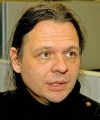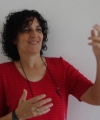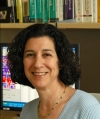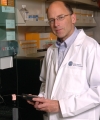Conference Chairs
Burkhard Rost, Conference Chair, Columbia University, New York, USA
Michal Linial, Conference Co-chair, The Hebrew University of Jerusalem, Jerusalem, Israel
Jill Mesirov, Conference Co-Chair, Broad Institute of MIT and Harvard, Cambridge, USA
Honorary Chair:
Thomas J. Hudson, Ontario Institute for Cancer Research, Toronto, ON, Canada
 Burkhard Rost
obtained his doctoral degree (Dr. rer. nat.) from the University of Heidelberg (Germany)
in the field of theoretical physics. He began his research working on the thermo-dynamical properties of spin
glasses and brain-like artificial neural networks. He moved briefly (1988-1990) in peace/arms control research
designing simple non-intrusive sensor networks to monitor aircraft. He entered the field of molecular biology
at the European Molecular Biology Laboratory (EMBL, Heidelberg, Germany, 1990-1995), spent a year at the European
Bioinformatics Institute (EBI, Hinxton, Cambridgshire, England, 1995), returned to the EMBL (1996-1998), joined
the company LION Biosciences for a brief interim (1998), and arrived at Columbia University in 1998. In 1992,
Dr. Rost developed the first Internet server for structure prediction (PredictProtein), and contributed a number
of methods that predict aspects of protein structure.
Burkhard Rost
obtained his doctoral degree (Dr. rer. nat.) from the University of Heidelberg (Germany)
in the field of theoretical physics. He began his research working on the thermo-dynamical properties of spin
glasses and brain-like artificial neural networks. He moved briefly (1988-1990) in peace/arms control research
designing simple non-intrusive sensor networks to monitor aircraft. He entered the field of molecular biology
at the European Molecular Biology Laboratory (EMBL, Heidelberg, Germany, 1990-1995), spent a year at the European
Bioinformatics Institute (EBI, Hinxton, Cambridgshire, England, 1995), returned to the EMBL (1996-1998), joined
the company LION Biosciences for a brief interim (1998), and arrived at Columbia University in 1998. In 1992,
Dr. Rost developed the first Internet server for structure prediction (PredictProtein), and contributed a number
of methods that predict aspects of protein structure.
His major research contribution has been the combination of machine learning tools and evolutionary information. His
academic research goal is to contribute toward the understanding of molecular evolution; his technical objective is to
contribute toward a coarse-grained modeling of a cell. Current research focuses on the prediction of protein function
from sequence and structure and structure prediction. It includes the prediction of subcellular localization, of
protein-protein and protein-substrate interactions, the prediction of impacts of residues mutations, the analysis
of protein networks, the development of a dynamic view of the protein sequence/structure universe, the development
of improved alignment algorithms, and the development of software systems that meet today's challenges.
 Michal Linial is a Professor of Biochemistry,
Molecular Biology and Bioinformatics at the Hebrew University of
Jerusalem, Israel, where she heads
The Sudarsky Center for Computational Biology. She is a founder (1999) and the chair of the undergraduate and graduate joint
programs in Computer science and Life Science at the Hebrew University.
Michal Linial is a Professor of Biochemistry,
Molecular Biology and Bioinformatics at the Hebrew University of
Jerusalem, Israel, where she heads
The Sudarsky Center for Computational Biology. She is a founder (1999) and the chair of the undergraduate and graduate joint
programs in Computer science and Life Science at the Hebrew University.She received her PhD from the Hebrew University's Medical School (1986) in Biochemistry and Molecular Biology. During her post-doctoral training in Stanford University, she engaged in molecular neuroscience with the goal of deciphering the molecular makeup of the synapse. She joined the Hebrew University (1989) and was a driving force in merging computational and analytical tools with classical wet biology.
Her laboratory is active in the two arenas - She leads a wet lab as well as a computational group. Her research interests span a broad range of topics such as stem cells, neuronal differentiation, synapse regulation, cell biology of secretory systems and the molecular mechanisms that underlie behavior. With the maturation of large-scale technologies, she has become involved in developing methods for target selection in Structural Genomics, protein family classification and the development of methodologies for the analysis of large-scale biological data sets. She is particularly interested in introducing powerful computational tools to meet the needs of the biological and bio-medical research communities. Among the web tools developed by her research group are PANDORA, ProtoNet, and EVEREST. One of her main recent areas of activity is proteomics where she combines experimental, technological and computational work.
She is the current Chair of the European Conference in Computational Biology, and a member of the steering committee of RECOMB. She is a member of ISCB's Board of directors, and is active in the Conference and Education committees and a liaison to the ISCB Student councils.
 Jill Mesirov
is chief informatics officer of the Broad Institute of MIT and Harvard where she directs the Computational
Biology and Bioinformatics Organization. She is also a member of the MIT Center for Cancer Research and adjunct
professor of bioinformatics at Boston University.
Jill Mesirov
is chief informatics officer of the Broad Institute of MIT and Harvard where she directs the Computational
Biology and Bioinformatics Organization. She is also a member of the MIT Center for Cancer Research and adjunct
professor of bioinformatics at Boston University.
Dr. Mesirov is a computational scientist who has spent many years working in the area of high-performance computing
on problems that arise in science, engineering and business applications. Her current research interest is
computational biology with a focus on algorithms and analytic methodologies for pattern recognition and discovery
with applications to cancer genomics, genome analysis and interpretation, and comparative genomics. In addition,
Mesirov is committed to the development of practical, accessible software tools to bring these methods to the
general biomedical research community.
In 1997, Dr. Mesirov came to the Whitehead Institute/MIT Center for Genome Research, now part of the Broad Institute,
from IBM, where she was manager of computational biology and bioinformatics in the Healthcare/Pharmaceutical Solutions
Organization. Before joining IBM in 1995, she was director of research at Thinking Machines Corporation for 10 years.
She has also held positions in the mathematics department at the University of California at Berkeley, the Institute
for Defense Analyses' Center for Communications Research in Princeton, and as associate executive director of the
American Mathematical Society.
 Dr. Thomas J. Hudson is President and Scientific Director of the Ontario Institute for Cancer Research (OICR).
He is recruiting more than 50 internationally recognized principal investigators to implement OICR's Strategic
Plan, which focuses on prevention, early diagnosis, cancer targets and new therapeutics.
Dr. Thomas J. Hudson is President and Scientific Director of the Ontario Institute for Cancer Research (OICR).
He is recruiting more than 50 internationally recognized principal investigators to implement OICR's Strategic
Plan, which focuses on prevention, early diagnosis, cancer targets and new therapeutics.
Dr. Hudson was the founder and Director of the McGill University and Genome Quebec Innovation Centre and
Assistant-Director of the Whitehead/MIT Center for Genome Research. Internationally renowned for his work
in genomics, he led the effort to generate dense physical and gene maps of the human and mouse genomes.
He is a leader in the development and applications of robotic systems and DNA-chip based methodologies
for genome research. Dr. Hudson and his team were founding members of the International Haplotype Map Consortium.
In 2007, Dr. Hudson was appointed Professor (status-only) at the University of Toronto. He taught in the
departments of Human Genetics and Medicine at McGill University and practiced medicine at the
McGill University Health Centre - Montreal General Hospital (Division of Immunology and Allergy).
Dr. Hudson is a fellow of the Royal Society of Canada. One of the co-founding members of P3G, he is
its Scientific Director. He is editor-in-chief of the journal Human Genetics.










